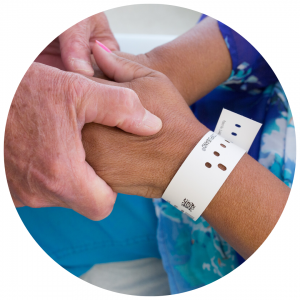What to Expect
Our approach
Management of sarcoma, regardless of the specific subtype, requires multidisciplinary care. We work incredibly closely with our colleagues across several disciplines, including orthopedic surgery, surgical oncology, radiation oncology, gynecologic oncology, interventional radiology, and palliative care.
We meet regularly as a multidisciplinary tumor board to review new patients or cases that would benefit from several providers’ perspectives. Good communication between these different specialties is of the utmost importance to us and to good patient care.
Our process begins with detailed pathological review by our team of expert sarcoma pathologists. As many sarcomas can be difficult to diagnose or classify, this step is critical to ensure we have the most accurate and most precise diagnosis before embarking on a treatment plan.
Sometimes, this involves additional testing beyond typical pathology staining, and may include molecular testing to define the genetic profile of that specific tumor. We also review all imaging in detail with a dedicated radiologist in our tumor board meetings.
As a group, we discuss the best approach to management, and collaboratively determine the ideal sequence to pursue different therapies, if multiple treatments are needed.
Treatments may include:
- Surgery: Done by sarcoma specialists in orthopedics or surgical oncology depending on the site of disease, sometimes done with multiple surgeons in collaboration.
- Radiation: May include longer courses of high intensity radiation either before or after surgery, or shorter targeted treatments called stereotactic radiation (SBRT).
- Chemotherapy: Many drugs can be used to treat sarcoma, some of the most common agents include doxorubicin, ifosfamide, gemcitabine with or without docetaxel, eribulin, and trabectedin. These drugs may be used alone or in combination.
- Targeted Therapy: Several sarcoma subtypes have specific drugs that target the gene mutations that cause the cancer itself. These include imatinib (and others) for GIST, palbociclib for liposarcoma, tazemetostat for epithelioid sarcoma, sirolimus for PEComa, and pazopanib.
- Immunotherapy: Activating the immune system to fight cancer is an important new way to treat cancer. It has not yet had a major breakthrough in sarcoma, but can be useful in some cases, such as angiosarcoma, alveolar soft part sarcoma, or UPS.
- Clinical Trials: We have several clinical trials available at our center, and we offer these treatments for patients when they are indicated and patients are eligible.
- Palliative Care: Management of symptoms from cancer and side effects from treatment are critical to maintaining good quality of life. We work closely with our palliative care providers to ensure symptoms are consistently addressed at every phase of cancer care.
Lastly, patient navigation is an essential part of the care we provide. Our nurse navigators help our patients find their way through their cancer treatment, whether addressing symptoms in between appointments, understanding the logistics involved in infusion visits, or figuring out who to call for help. They help our big cancer center feel much smaller and more accessible and are a key resource for our patients in their cancer journey.
What should I bring?
It is important that we obtain your pertinent medical records including applicable radiology reports, lab reports, pathology slides, and medical summaries. You should bring copies of these reports to your first appointment. Whenever possible you should obtain the original x-ray films and pathology slides from your doctor. If you have had surgery related to bone or soft tissue cancer, you should also bring a copy of the operative note.
Please bring the following to your clinic appointment:
- Your physician’s name, address and phone number
- Your patient identification card if you have been seen before at UNC
- Your insurance card and any other related forms required by your insurance company
- List of allergies and medications you are taking with the dosages
- Imaging studies and reports
- Pathology slides and reports
- Operative notes
What is a tumor board?
If the patient is seen by more than one specialist, these physicians will discuss the patient’s case and work together to develop a treatment plan. Multidisciplinary tumor boards bring together doctors and other health care providers with different specialties to discuss cancer cases and share knowledge. The board’s goal is to determine the best possible cancer treatment and care plan for an individual patient.
What support services are available to me?
 Arrangements may be made for the patient to meet support service providers. These might include a social worker, a financial counselor, a chaplain, a patient counselor, or a nutritionist, depending on the patient’s needs and interests.
Arrangements may be made for the patient to meet support service providers. These might include a social worker, a financial counselor, a chaplain, a patient counselor, or a nutritionist, depending on the patient’s needs and interests.
Patients will have an opportunity to visit the Patient and Family Resource Center where they can obtain information about their diagnosis and learn about support groups and resources for individuals with cancer.
Adolescent and Young Adult Care
Some sarcomas can occur in young children, such as osteosarcoma, rhabdomyosarcoma, and Ewing sarcoma. These can occur in teenagers and young adults as well, at which point we may care for them in our adult cancer center.
We know that the needs of young people with cancer can be quite different from those of older adults, and we view meeting those needs as a high priority at our institution.
We have a novel collaborative care model for young adults with cancer built around a team approach, including the medical oncologist, a social worker with expertise in caring for younger patients, a pediatrics-trained palliative care physician, and specific support from pharmacy, patient navigation, a fertility specialist, and others.
We acknowledge the immense challenge of facing cancer as a young person, and we strive to meet the often complex and highly individual needs of our younger patients.
The UNC AYA Program work with adolescent and young adult cancer patients ages 13 to 39.

